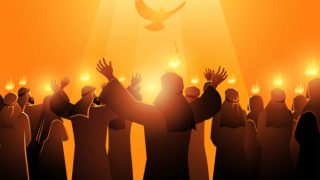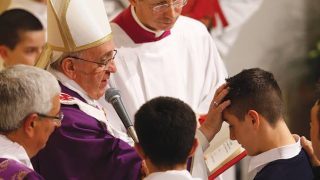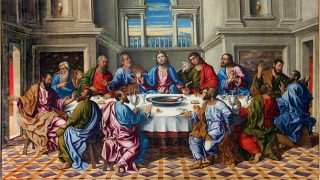
FAITH AND FEAR
HOMILY FOR SECOND SUNDAY OF EASTER (DIVINE MERCY SUNDAY) YEAR A. Readings: Acts 2:142-47; Psalm 118; 1 Peter 1:3-9 and John 20:19-31
Today is a day of mixed feelings. The memory of the crucifixion is so fresh in the minds of the apostles, and they lock themselves in the upper room for fear of the Jews, most likely in the thought that what had befallen their master would be their fate as well. Probably the voices of the murderous crowd shouting “Crucify him” still echo in their ears and their peace is distorted. When they saw the risen Lord, they were glad. So, we can place side by side their fear of death and the joy of the resurrection. If we believe and have faith in the resurrection, why do we still live in fear?
In the course of the week, we followed Christ’s apparitions to Mary Magdalene, to the two disciples on their way to Emmaus, and to the eleven. Today, John’s gospel presents to us his greeting of peace and the commissioning of the disciples as He says “Peace be with you. As the Father sent me, even so I send you” (vv. 19-21).He breathed on them and said to them, “Receive the Holy Spirit. If you forgive the sins of any, they are forgiven; if you retain the sins of any, they are retained” (vv. 22-23). This moment became the turning point for the apostles in the power of the Holy Spirit which they had received. For, their fears diminished while boldness took over. Being filled with the Holy Spirit, they left their self-imposed prison to go out and spread the message of Jesus, just as he had commissioned them to do.
It is noteworthy that we celebrate on this day, the institution of the sacrament of reconciliation where with forgiveness of sin, Christ breathed on the apostles saying, “Receive the Holy Spirit, whose sin you forgive are forgiven…” We recall in Gen 2:7, God breathed on man to give him life. Today Christ breathes on the Apostles to restore life to one that is spiritually dead and gave them the power to forgive sins. This power is reserved for God alone, and when the priest forgives sin, he does so only with the authority of Christ bestowed on him. At this point, we cannot subject God’s mercy to human reasoning.
Thomas was not with them when Christ first appeared to the disciples. Probably he was the boldest of all to go out since others were living in fear of the Jews. We know fear to be the opposite of faith. Even Christ, when walking on water, associated Peter’s fear with lack of faith. This was what Thomas lacked, the faith to believe Divine revelation. Our penny catechism tells us, “Faith is a supernatural gift of God, which enables us to believe without doubting whatever God has revealed.” Thomas was bold and was without fear, but did not believe in the resurrection. He refused to believe that the others had seen Christ, he demanded a pragmatic proof which he received when Christ said to him, “Put your finger here and feel my wounds.” At this instance, he recognized his frailty and not only believed in the resurrection but confessed that Jesus Christ is God when he said, “My Lord and my God.” In a subtle manner, Thomas was so slow to believe but when he eventually did, he offered a valuable insight into God’s mercy and kindness. Through him, Christ invites us to be confident in his words, “Blessed are those who have not seen and yet believe.” If we cannot see the risen Lord, we can see something else: the Christian community, which is the evidence that Christ is alive and is with us.
Christ remains alive in the life of the community members, which St. Luke recounts in the first reading telling us that “Fear came upon every soul; and many wonders and signs were done through the Apostles” (Acts 2:43”). Notable in this context is the fear of the Lord, which is equated with wisdom (Job 28:28) and knowledge (Prov 1:7). The fear of the Lord gives confidence (Prov 14:26), that the Apostles who used to be afraid and were hiding are now courageous in their teachings and witnesses to the risen Lord. This fear is the kind of respect people feel in the presence of the Lord, which enabled the Apostles perform great wonders and signs. The Old Testament uses the phrase “signs and wonders” to speak of God’s revelation of himself through the use of his power in saving Israel (Ex 7:3-5; Deut. 4: 34-35). These signs and wonders continued in the New Testament for the purpose of revealing something about God or establishing the credibility of the Apostles who were working the signs and wonders. Going further, Luke said, “All who believed were together and had all things in common” (Acts 2:44). Like the early Christians, God wants us to share our lives with one another.
St. Peter in the second reading, draws our attention to the gratuitous mercy of God towards us as he puts it, “Blessed be the God and Father of our Lord Jesus Christ! By his great mercy we have been born anew to a living hope through the resurrection of Jesus Christ…” (1 Peter 1:3). This beautiful passage (vv.3-12) is the outpouring of an adoring heart. Only one who has devoutly contemplated the greatness of our salvation could utter such a magnificent paean (song) of praise, one that prepares and encourages the suffering soul to steadfastly continue the spiritual battle. St. Peter, who has expressed his weaknesses in various ways and have experienced God’s mercy could speak of it. All His goodness to us begin with mercy.
As we are by nature, justice condemns us and holiness frowns upon us. It is from the mercy of God that all our hopes begin. It is also called a ‘living hope,’ because it is imperishable, undefiled and unfading. The necessary tool for attaining the hope of salvation is faith. This is so because “Without having seen him you love him; though you do not now see him you believe in him and rejoice unutterable and exalted joy. As the outcome of your faith, you obtained the salvation of your souls” (v.9). As Christ said to the doubting Thomas who did not see him at his first apparition, he says to us too, “Blessed are those who have not seen and yet believe” (Jn 20:29). It is our faith and belief that the one who died on the cross, of whom Blood and Water gushed forth from His side will never die again.
Concisely, the allusion to water and blood of Christ since Good Friday already speaks loudly of today being Divine Mercy Sunday. This was when blood and water gushed forth from the side of Christ on Good Friday, the day on which we began the novena to this Sunday’s celebration. We therefore pray today through the intercession of St. Maria Faustina, that God will increase our faith, destroy our fears and have mercy on us, and on the whole world. Amen.
Happy Divine Mercy Sunday!
Fr. Ken Dogbo, OSJ










